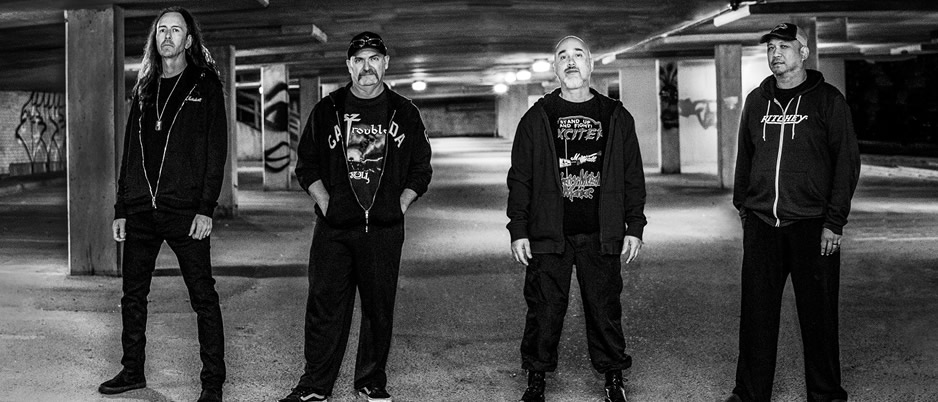SOURCE – Volume Six is the latest Sacrifice record. How did the songwriting and recording sessions go for this set of material? Where do you see the balance between meeting the expectations of the band’s followers/fans and satisfying your own creative process at this point in the group’s career?
Rob Urbinati (Guitar, Vocals) – The songwriting took a little longer than we expected, but the whole recording process went really well. We don’t really try to set any balance or anything; I guess our main criteria is, “Do we like it?” If we like it, that satisfies our creative process. We know what we are best at, and we follow that direction.
SOURCE – You’ve released one single to date for the album. How do you feel about the response so far to this track, and how has the band handled this newer release schedule, compared to the older methods of the past?
Rob Urbinati (Guitar, Vocals) – The response has surpassed our expectations, every review we’ve had has been very positive and fans of the band seem to like the single a lot. It’s been a long time since we’ve released an album, the band wanted it to be a memorable one.
SOURCE – How much of a challenge is it, as a legacy band, to remain fresh and relevant with new material while avoiding repeating what’s already been accepted through your classic work from the ’80s and early ’90s?
Rob Urbinati (Guitar, Vocals) – I think the main thing is to concentrate on the songwriting. You should put together songs that have twists and turns and don’t let the songs get boring. Just go with your instincts and don’t try to fit in with what is popular now. That’s always a recipe for disaster—trying to follow what is in right now.
SOURCE – How do you think the relationship between music videos and digital platforms has changed the way bands engage with their audiences, particularly younger generations?
Rob Urbinati (Guitar, Vocals) – I really have no idea about that. It seems like not much has changed with videos, other than they are online instead of on TV now. The digital platforms seem overloaded with content; it must be really hard for new bands to get noticed today.
SOURCE – Spotify CEO Daniel Ek recently angered many musicians when he said that, in the age of streaming, musicians cannot ‘record music once every three to four years and think that’s going to be enough.’ What is your take on that?
Rob Urbinati (Guitar, Vocals) – Well, the amount that streaming services pay artists is pretty much criminal behavior. I’m not so sure that affects metal bands as much, but touring is also very costly today. It’s really not the greatest era to be a musician or an artist of any medium.
SOURCE – Many people consider Forward To Termination to be one of the best Thrash Metal albums. Are you aware of the status the album has achieved?
Rob Urbinati (Guitar, Vocals) – Not really, I guess. I think most of our fans consider it to be our best, but others also pick something else. It always feels good to hear that, though. At the time we did it, we really felt like we had turned a corner and had become a much better band.
SOURCE – Sacrifice is a highly influential band for many musicians. Does it feel strange when bands cite your music as an influence on theirs?
Rob Urbinati (Guitar, Vocals) – It feels great to hear that, honestly. For your musical peers to say that your music has been inspirational to them is quite a compliment. For example, last year Max Cavalera said Forward to Termination was one of his top three thrash albums ever. We are fans of his music too, so that’s amazing to hear.
SOURCE – What’s next for the band after the album is released?
Rob Urbinati (Guitar, Vocals) – Play some shows!
Photo Credit: band
Contacts:
Video:
- NOTE ABOUT AI USE IN THIS DOCUMENT!
This document has been thoroughly reviewed and corrected for spelling, grammar, and syntax errors using advanced AI-driven proofreading tools. The AI system used is designed to analyze and enhance the language of the text, ensuring it adheres to proper English conventions while maintaining the original meaning and tone.
The proofreading process involved identifying and correcting typographical errors, sentence structure issues, and inconsistencies in punctuation. The document has been refined to meet the highest standards of spelling, grammar, and overall readability.

